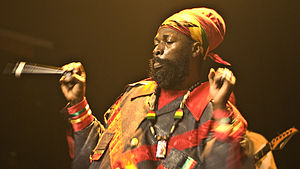Capleton
| Capleton | |
|---|---|

Performance in Spain 13 November 2008
|
|
| Background information | |
| Birth name | Clifton George Bailey III |
| Also known as | King Shango, The Fireman, The Prophet |
| Born |
13 April 1967 Islington, St. Mary, Jamaica |
| Genres | Reggae, roots reggae, dancehall |
| Occupation(s) | Musician |
| Instruments | Vocals |
| Labels | VP, African Star/RAL/PolyGram Records, Rude Boy, Exterminator |
| Website | www |
Clifton George Bailey III (born 13 April 1967), better known by the stage name Capleton, is a Jamaican reggae and dancehall artist. He is also referred to as King Shango, King David, The Fireman and The Prophet. His record label is called David House Productions. He is known for his Rastafari movement views expressed in his songs.
Bailey was born in Islington in St. Mary in 1967. As a youth, he was given the surname of a popular St. Mary lawyer and friend of the family, Capleton, as a nickname by his relatives and friends. Capleton rejects the name given to him at birth, given its European origin. He now prefers "King Shango", given its roots in the Yoruba language.
As a teenager, he sneaked out of his home to catch local dancehall acts, eventually leaving St. Mary for Kingston at the age of 18 to work on his career as a dancehall deejay.
In 1989, he got his first big international exposure. Stewart Brown, owner of a Toronto-based sound called African Star, gave the untested artist his first break, flying him to Canada for a stage show alongside Ninjaman and Flourgon.
When Capleton first arrived on the scene in the late 1980s, slackness and gun talk were the dominant lyrics in the dancehalls. The pre-Rasta Capleton had a string of hit songs from "Bumbo Red" to "Number One on the Look Good Chart" and "No Lotion Man".
He recorded the song that began to establish his significant place in Dancehall, "Alms House" in 1992. The tune became a big hit in the dancehall, followed up immediately by "Music is a Mission" and the massive hit "Tour". By 1993, he was voicing tunes which became increasingly conscious, such as "Prophet" and "Cold Blooded Murderer".
Tunes such as "Tour" and "Wings of the Morning" earned him a deal with Russell Simmons' Def Jam Recordings, which culminated in the Prophecy and I-Testament albums of the mid-1990s.
In 1999, Capleton headlined Reggae Sumfest's dancehall night, to much fanfare. The performance, which led to a subsequent headliner placement the following year, is credited with "re-bussing", or creating a comeback for, his career. The 1999–2000 period elicited a string of hits, many of which can be found on the album More Fire.
...
Wikipedia
